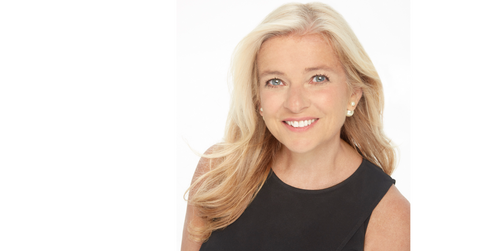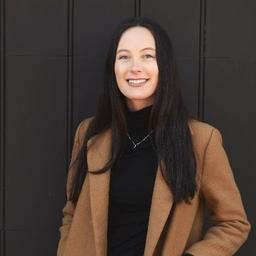In a seemingly uncertain world, Joy Marcus looks to the future with optimism. As co-founder and General Partner of The 98, an early-stage venture firm that invests in women-led technology businesses, and a lecturer at Princeton University’s School of Engineering, Joy is engaged in ongoing mentoring of the next generation of entrepreneurs, thinkers, and leaders.
It’s through the process of sharing her decade’s worth of expertise with the next generation as they galvanize their vision for the future that Joy’s optimism is born. While her accomplishments as a venture capitalist and professor are significant, these are only the most recent. She received her law degree from New York University School of Law. She spent twenty-five years in digital media and commerce, launching and growing digital businesses for legacy companies like Conde Nast, Time Warner, MTV Networks, and more. Her presence as a changemaker and deal maker earned her recognition in the Digital Power 50 by The Hollywood Reporter and Forty Over Forty by Forbes.
We had the opportunity to speak with Joy and hear her dispatches from the front lines of entrepreneurial innovation.
Her Agenda: It seems impossible to pin you down into one box or introduce you as one single thing. I’d love to hear from you about what you do.
Joy Marcus: I appreciate that. If you’d asked me that five or six years ago, I would have said that I’m an expert in digital media. That’s really where I spent most of my career, culminating in a pretty big role at Conde Nast. Since then, I would say it’s almost my second career. The overarching thing that I do is mentor and support. That’s common to everything I do. I am very much a Princeton professor and I am very much a venture capitalist. And I think those two things really complement each other.
In my role at Princeton, I spend time with brilliant young people, helping them along their potential entrepreneurial path. I teach an introductory course, so I’m putting in their minds this idea of perhaps being an entrepreneur and straying from what is the most conventional path for a Princeton graduate, which is advanced education of some kind and/or investment banking, consulting in those kinds of traditional jobs. So, part of my job is to help them think about another path potentially, or at least another step down the road, and to really open up their minds. What I get from them is far greater, which has helped me do the other part of my job, which is to predict the future. I basically stare down the future, 68 [students] every week, and they really are telling me what’s important to the future of humanity. Then I get to look at young companies run by brilliant young women who want to help shape that future and be part of that future. So the two things really go together extremely well. And I’m a better venture capitalist because I teach. And I’m a better teacher because I’m a venture capitalist. So they really fit hand in glove one with the other, and I’m very fortunate to have those two things working together in my life right now.
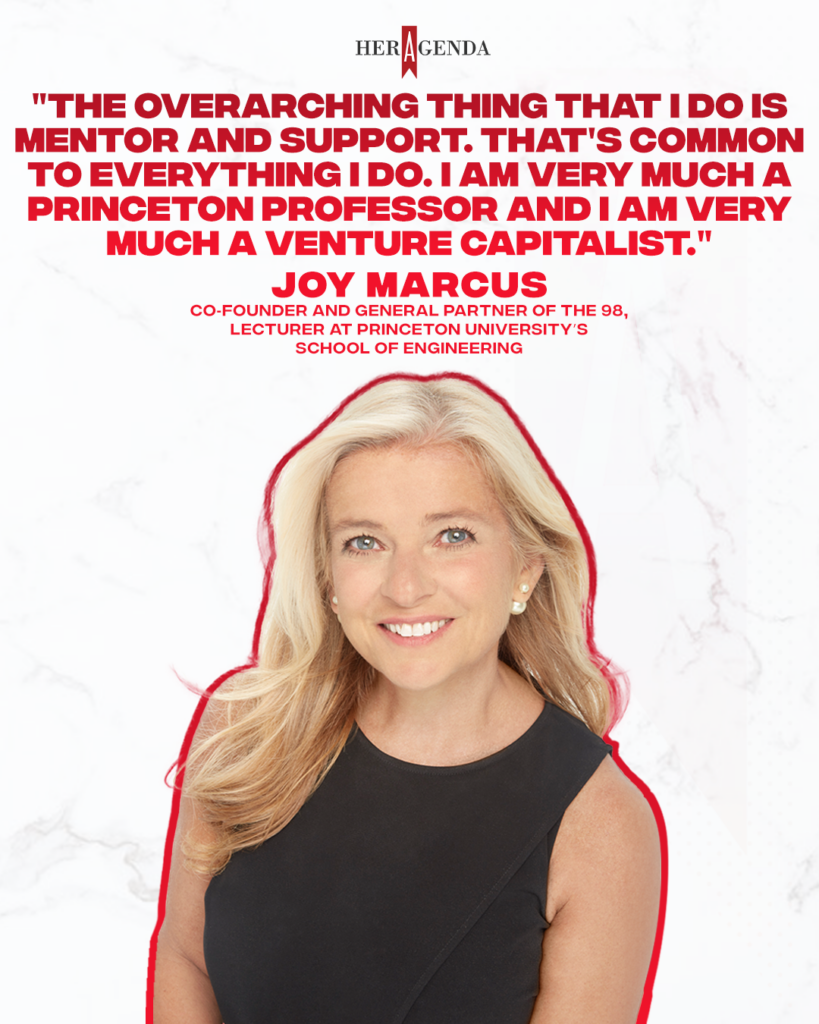
Her Agenda: The theme of stewarding the future is prominent. You used that phrase, encouraging them to consider other options and stray from the traditional path. Is that a value that you have held highly in your own life? What does that mean for you?
Joy Marcus: I wouldn’t call it a value. For me, it was always a desire to make things better, change things, and not live the status quo. I think you see that peppered through my career. The things that I chose to do, generally, even when I was at very large companies, were kind of at the edge of what the large company was doing. So, even back at MTV Networks, I was working on bringing MTV internationally. At Conde Nast, I worked on video. Conde, certainly at the time, was primarily print publications, and video was very different for them. So, I always like to be doing the new thing, challenging the future.
I think it’s spilled out in this next phase of my career, which is all about change, essentially just encouraging change and creating value through change. That’s what entrepreneurship is: it’s changing something that’s the status quo, either by creating something new or making something better and creating value. What we look for in companies that we choose is exactly that. Is this company going to create something new that will be of value?
However, so much of what venture really is is about teaching, mentoring, and supporting, just like my role at Princeton. With the firm that I founded with my partner, Lynda Clarizio, we are extremely active venture capitalists. We invest with a female lens, so we invest in gender-diverse teams. There needs to be a woman high up on the cap table in a non-investing position. So, an operating person who owns a big, big piece of the company, that is a woman, [needs to be in place] in order for us to invest, but we love gender diverse teams as well.
Our firm belief is and the reason we founded the firm is because of this great discrepancy. Exclusively female-led firms only receive 2% of all venture capital. And that number has been consistent for the last 10 years. It’s an absolutely disgraceful number. The number gets a little bit better If you add a man to the mix, then it’s more like 12%. However, close to 88% of all venture capital invested goes to all-male teams, which is just a travesty. It’s not good for humanity to have the technology that we all rely on built almost exclusively by men. So that’s the reason we founded The 98.
We are extremely active investors. So yes, we give capital, but it goes far beyond that. We provide expertise, mentorship and networking and help our companies in a way that is atypical.
Her Agenda: And it sounds like along with the expertise, there’s that element of relationship building.
Joy Marcus: Yes, we try to develop very strong relationships with our founding teams. And look, a venture capital relationship is usually quite long. Companies take a bit of time to exit, so it’s an important relationship in these people’s lives. It’s an important relationship for us, and we really work on it as we would on any relationship, but mostly, what we’re doing is we’re just trying to bring to bear that expertise we’ve gleaned that we’ve created as well.
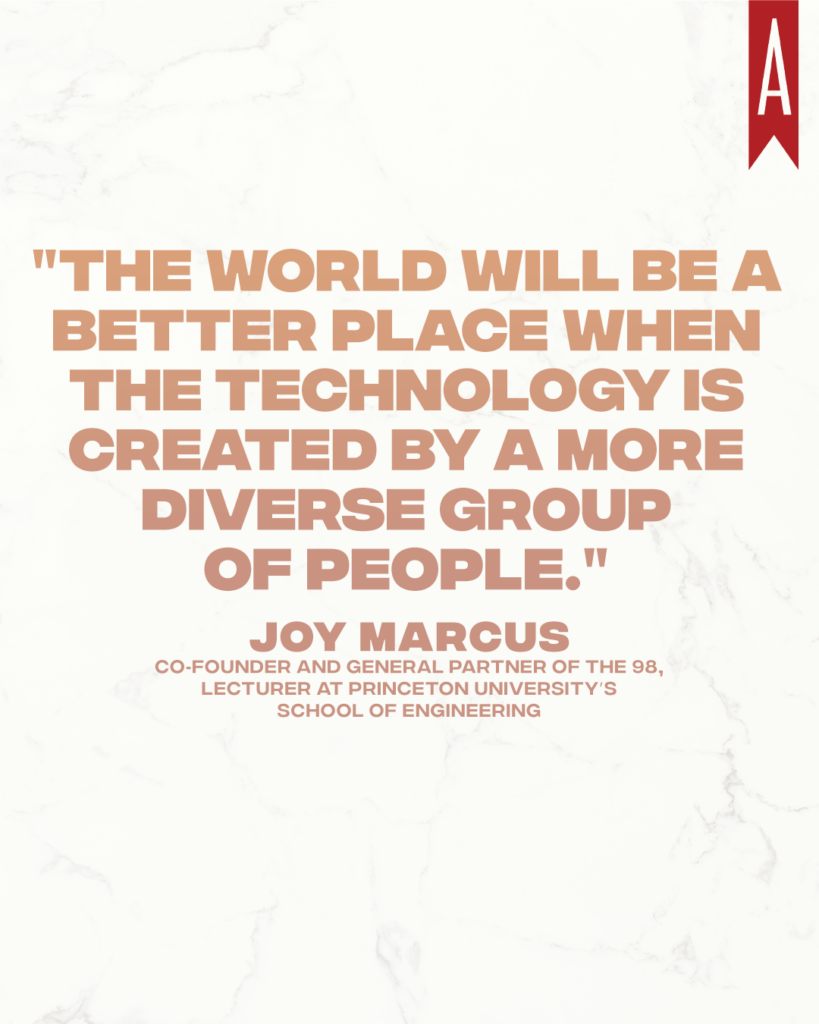
Her Agenda: The thoroughness of the mission you’re serving really comes through. The idea of the expertise you’re bringing in and also looking to the future creates a meeting of these two different timelines.
Joy Marcus: Yes. My life is really about the future right now. It’s about teaching. I’m very fortunate to teach pretty brilliant young minds and then invest in the future and the brilliant young women and men that we invest in.
Her Agenda: I’m curious if you’re able to share anything about what that future looks like.
Joy Marcus: I can tell you that I’m super optimistic for a number of reasons. And it’s not so easy to be optimistic these days. There’s lots going on that would make one not feel that way. [But] I think we are raising a very self-knowing, fierce generation now. It’s like they are living their lives out loud. They are not afraid to state their opinions and to ask for help when it’s needed. And I think that is so different than my generation or even the generation in between. We were more reserved in our ability to express ourselves and in our ability to ask for help when needed. And I think this generation has no fear. So, I am super optimistic.
I also think they care a lot. And you know, if I had to say themes that come up both in my class and also in the companies that I meet, they really deeply care about the planet in a way that I find reassuring, and I think there is a fear that the planet is going to explode, and they don’t want that to happen. They think they’ve inherited this big mess from us, and which, to a certain degree, they have anger, but they’re going to do something about it.
I think there’s going to be a lot around being really protective of climate. I think there is going to be a lot around the protection of individual freedoms and choices. I think women, in particular, are going to be technologists in a number that we just haven’t really seen before. The image of who is a tech technologist who is a scientist is going to shift from the image we currently have, and I see that again in my work as a venture capitalist but also in my classes at Princeton. The world will be a better place when the technology is created by a more diverse group of people.
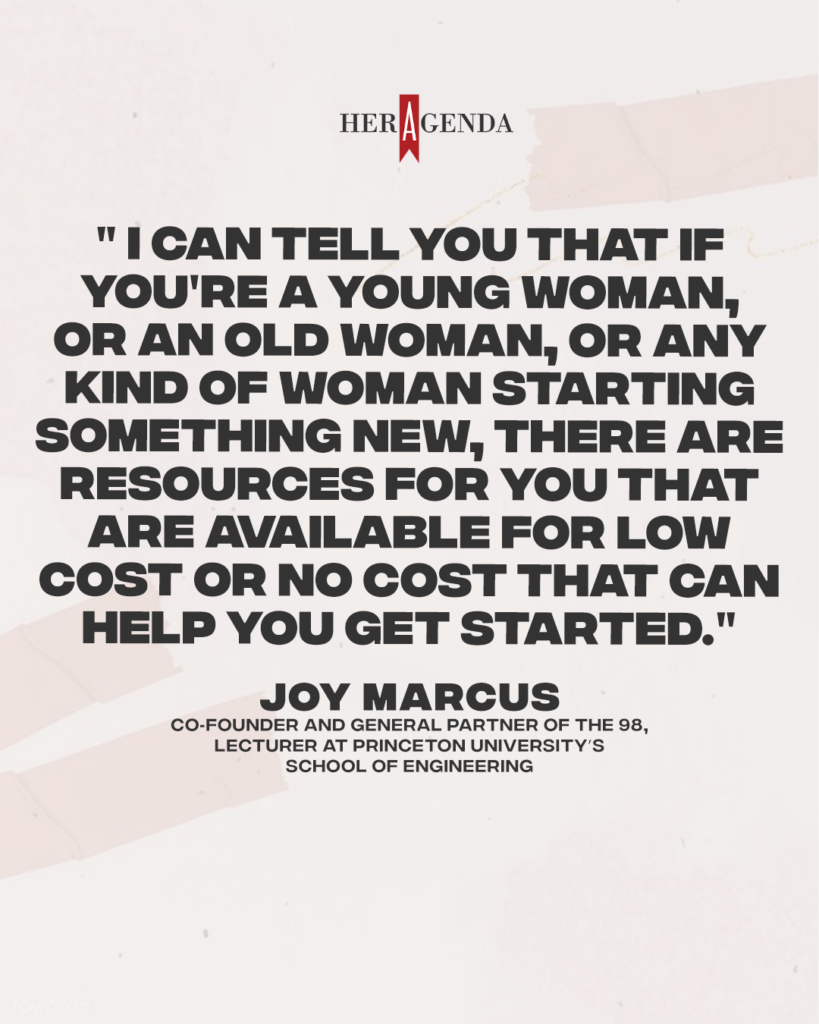
Her Agenda: Could you talk a little bit more about the implications when that image changes?
Joy Marcus: I mean, I always think about like some very basic examples. I think about if Uber had been created by a woman or with a woman, would all the safety issues not [have] been pre-thought of? Or if Instagram had more women early on, would they have raised issues of what this kind of medium does to the image of young teenage girls? So I think that women in the mix just make things better and there’s all kinds of data around this. There’s data that shows that companies are more successful when they have diverse teams, and that women-led teams return better and faster. I mean, I can inundate you with data. So that’s all quantitative, and that’s great. And that’s what makes it a really good thesis for my investment firm. But there’s a qualitative part to it, too, which is I think the products will be less harmful, potentially.
Her Agenda: Given your experiences, what advice can you share with our readers?
Joy Marcus: I think there are opportunities out there at all levels now. There are all kinds of incubators and collectives. I think society is answering that call and that there are people who are there to help. I think that if you look, you will find it. I can tell you that if you’re a young woman, or an old woman, or any kind of woman starting something new, there are resources for you that are available for low cost or no cost that can help you get started.
Her Agenda: That ties back into what you said earlier about witnessing people not being afraid to ask for help.
Joy Marcus: I am very confident that this generation will do that. The economy in this country really runs on small businesses, so there are resources available to help people start these businesses. And [majority of those small businesses], they’re outside [what is considered] venture [backable]. The venture capital system is about, high, multiple returns, And those tend to be in tech and that’s where we invest. That’s our job. There are folks who invest in small businesses. There are support networks for those kinds of businesses. Venture capital is not the right one for that, I will tell you. It just isn’t because the returns are not as immediate and as high. But there are other resources for people like that and I highly encourage them to just look because they will find it.
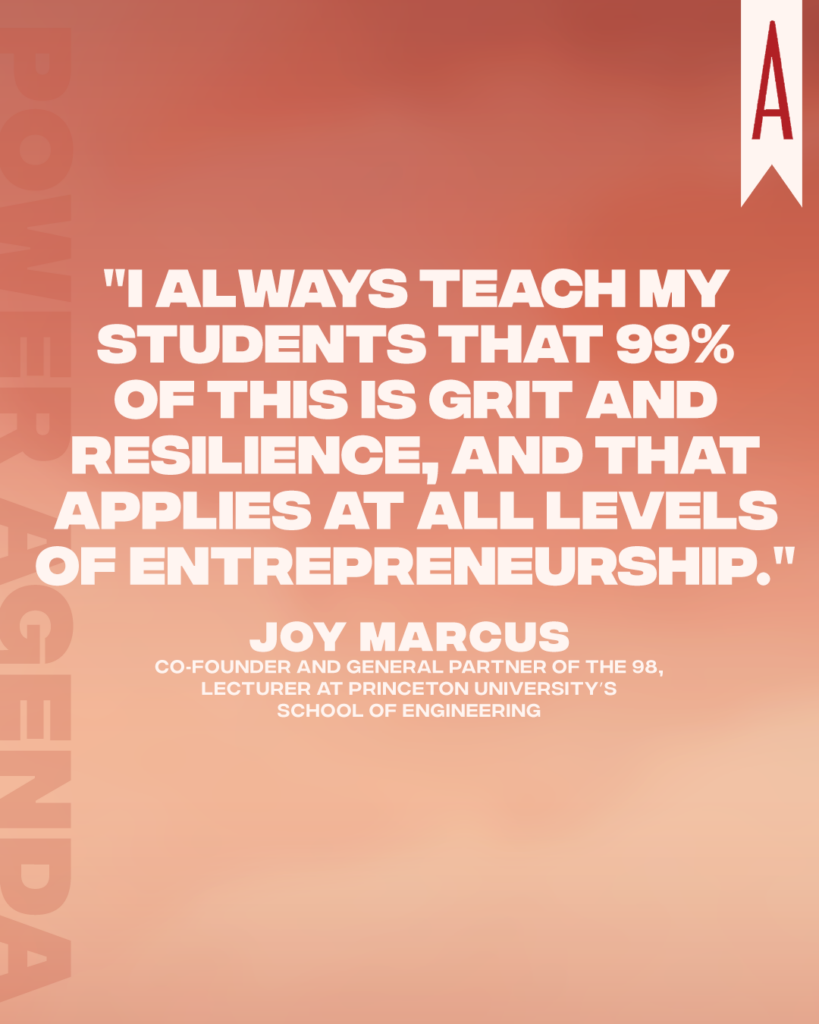
Her Agenda: Thank you for making that connection. I think that’s really helpful for people to have in mind. And on that note, I’m curious if you have any other last thoughts that you wanted to share.
Joy Marcus: [Whether] you’re a small business owner or just starting a new business [that’s] not venture-backed, some of the same principles that I teach apply. First of all, you have to understand the market you’re going into, and you have to understand what the potential of the thing you’re creating is. If it’s so, so teeny, it may not be worth your time. So you need to recognize, is this worth my time? How big will this get? Is this going to have enough impact that I want to spend my time? A lot of people jump into things without really thinking about that in a very disciplined way, which I think would apply to anything you’re doing, whether it’s a bakery or sporting goods store [or a] bank company. Apply that discipline, it may be big enough for you, and that’s fine, but apply that discipline.
Then, I always teach my students that 99% of this is grit and resilience, and that applies at all levels of entrepreneurship. You’re gonna get whacked around a bit, and everyone does, and what differentiates those who succeed is the ability to pick themselves up and keep at it. And then finally to recognize when it’s really not working: the ability to say ‘You know what? This is not going well, it’s not going to go well, my time is better spent figuring out what I’m going to do next.’
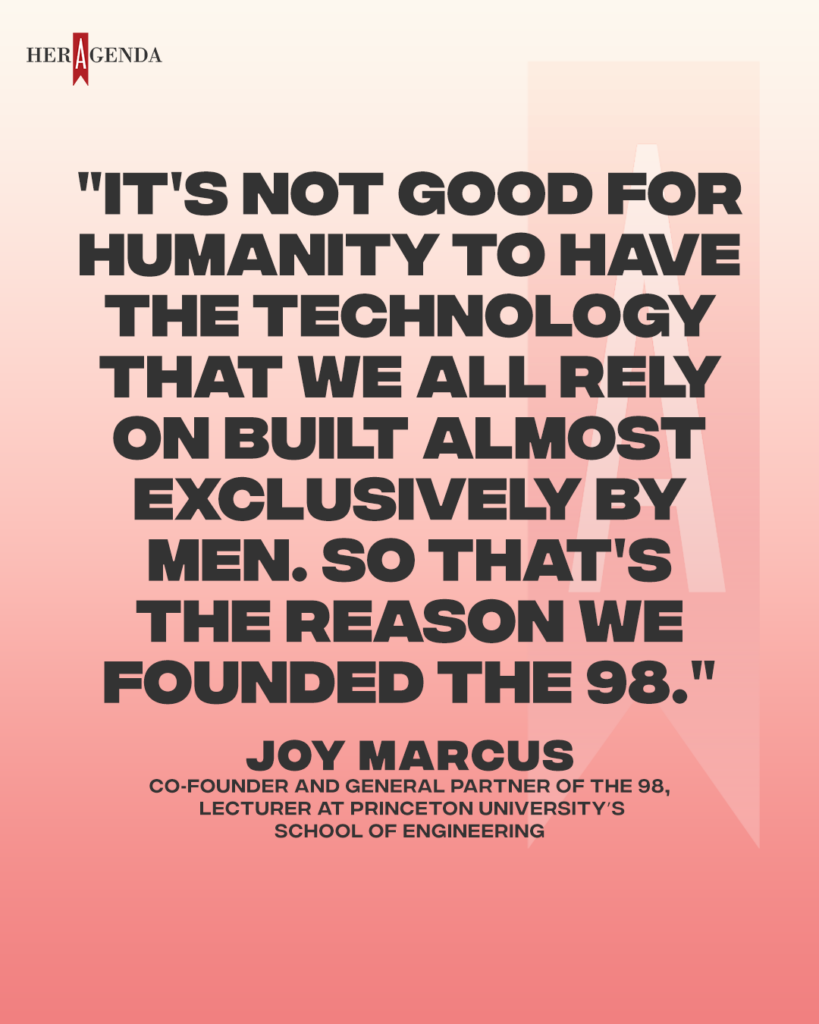
[Editor’s note: This interview has been edited for length and clarity.]

